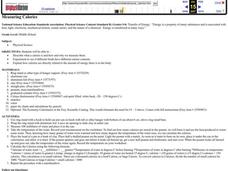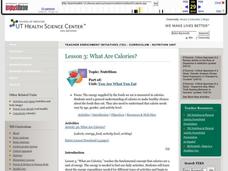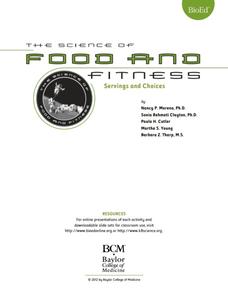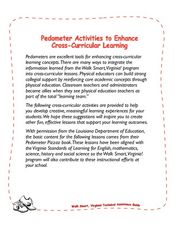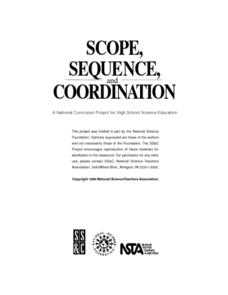Curated OER
Measuring the Number Of Calories In Sunlight
Students., in groups, define calorie and compare the absorption of solar energy by three different collectors. They define solar constant and offer several explanations for discrepancies between the data collected and the solar constant.
Curated OER
Math in Science-Knowing the Calories You Take In!
I can burn off one scrambled egg in 30 minutes of walking? Explain how we daily consume and burn calories using this fun worksheet, which breaks down basic foods and activities into kilocalorie equivalents. Nutritionists calculate the...
Curated OER
Calorie Connection
Young scholars calculate the calories in a Brazil nut and the calories needed for daily intake. In this calories lesson plan, students use calorimetry to measure the change in water temperature heated by the burning of a Brazil nut. They...
Curated OER
Measuring Calories in Food
Students measure the amount of calories in food. In this food energy instructional activity, students discuss what a calorie is, how our bodies use a calorie, and how many we need. Then, students use a calorimeter to calculate the amount...
Curated OER
Calories and Nutrition
In this calories worksheet, students use a chart comparing the calories found in different food items to complete 3 short answer questions.
Curated OER
Measuring Calories
Students investigate what a calorie is and how and why we measure them. They conduct an experiment to compare the calories of a peanut and a mini-marshmallow, and explain and discuss how calories are directly related to the amount of...
Curated OER
Measuring Calories
Students burn peanuts and marshmallows to determine the calories each contains. For this calorimetry lesson, students set up an apparatus with a ring stand and water in an aluminum can. They record the temperature of the water before and...
Curated OER
What The Peanuts Say: Catabolism and Calories
Students investigate the energy released by a peanut and a piece of a walnut. In this catabolism and calories lesson plan, students burn a peanut and a piece of a walnut and measure the temperature of the water before burning and after...
Kenan Fellows
How Much Energy Is That Anyway?
The fifth lesson in the six part series introduces units of energy including calories, Calories, and joules. Scholars determine the energy released when eating a snack and during activity.
Curated OER
Nutrition -- A Lesson for Life - Biology Teaching Thesis
Students briefly explain the importance of nutrition in their everyday lives, and they tell you about how many calories they should consume in a day. They list readily available and affordable healthy foods that they LIKE to eat....
Curated OER
What Are Calories?
Students examine calories for the human body. For this calorie lesson, students explore the energy expenditures needed for different types of activities and how many calories are needed to support daily functions.
Curated OER
Nutrition: How Much Fat Am I Eating?
How much fat is in this? Scholars first read some background information on the caloric content of fats versus carbohydrates, and then use that knowledge to analyze foods they regularly eat. They will look at 5 package labels for the...
Curated OER
How Much Do You Burn?
Sixth graders discover their weight relative to the other children in their class. They determine how many calories they burn through exercise and compare it with their classmates. Using the internet, they calculate their body mass index...
Nuffield Foundation
How Much Energy Is There in Food?
People associate calories with food, but what is a calorie? Young scientists measure the number of calories in samples of food to better understand the concept. They test a variety of samples, take measurements, and compare their results...
Virginia Department of Education
Thermochemistry: Heat and Chemical Changes
What makes particles attract? Here, learners engage in multiple activities that fully describe colligative properties and allow the ability to critically assess the importance of these properties in daily life. Young chemists...
Baylor College
Servings and Choices
An important part of balancing caloric intake to energy expenditure is knowing how many Calories you are consuming. In the fifth of a seven-lesson series on food and energy, learners estimate their daily caloric intake, then use a...
Curated OER
What Are You Eating?
Discover the calorie content of foods by observing how much heat they produce in water. If you have a calculator-based laboratory (CBL™) insturment for collecting data, then this laboratory worksheet will not need any changes. If...
Curated OER
Food Energy
In this food energy worksheet, students review calories and how calories are determined. Students calculate how much thermal energy it would take to raise certain volumes of water a certain number of degrees. This worksheet has 3 word...
Curated OER
Calorimetry
Learners investigate calorimetry and set up equipment to measure calories. For this calorimetry lesson plan, students make a calorimeter and compare large amounts of heated water with small amounts to show the difference in calories....
Curated OER
Dietary Guidelines
Students study the dietary guidelines and what they do. In this healthy eating lesson students study nutrition labels and calorie needs.
Science Geek
Basic Thermochemistry
Heat is more than just temperature, as viewers discover throughout a presentation about thermochemistry that emphasizes vocabulary. Definitions include joule, calorie, energy, enthalpy, calorimetry, exothermic and...
Curated OER
Pedometer Activities to Enhance Cross-curricular Learning
Students complete different activities involving pedometers such as writing a creative story, calculating step averages, researching pedometers, calculating calories, and much more.
Curated OER
Heat and the Second Law of Thermodynamics
More than a week's worth of investigation is provided in this source. Physical science stars experiment to describe specific heat, conduction, convection, and radiation. They also discover the relationship between mechanical and thermal...
Curated OER
Heat, Temperature, and Transfer
Physical science scholars discover an array of heat sources. They experiment to connect radiation to heat. They begin to understand thermal equilibrium. Then, they test to see if mass affects the rate of temperature change. Choose a few,...
Other popular searches
- Burning Calories
- Counting Calories
- Calories Burned
- Calories From Fat
- Count Calories
- Comparing Calories
- Food and Calories
- Calories Exercise
- Activities Calories Burned
- Exercise and 100 Calories
- Calories of Certain Foods
- Calories in Food





